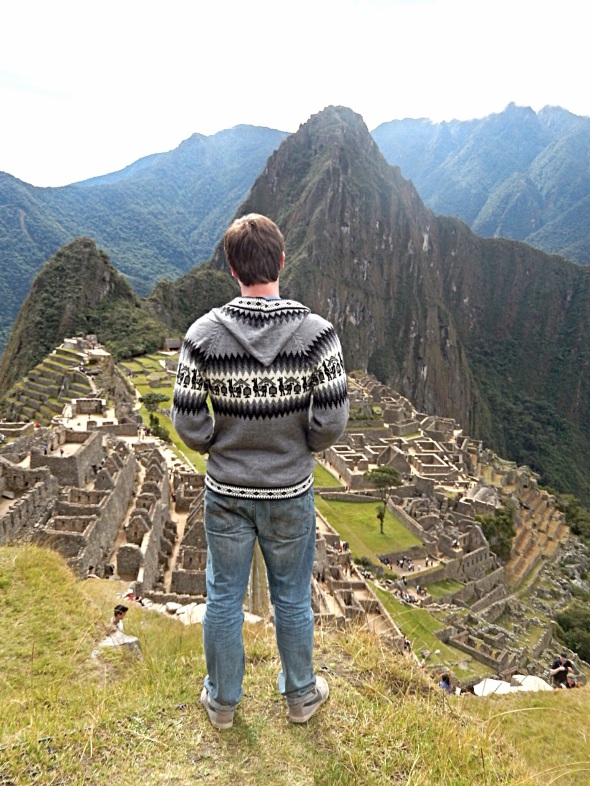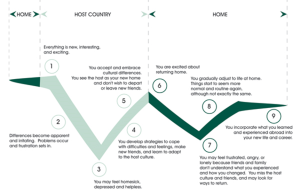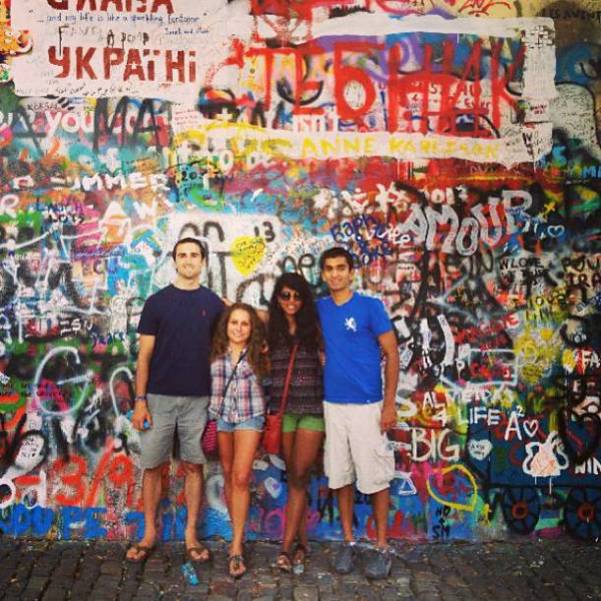Thailand: Then and Now
Posted: June 6, 2014 Filed under: Student, Thailand, Travel Leave a commentBy: David, a Senior at Sewickly Academy
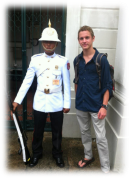 I embarked on my trip to Thailand not knowing what to expect. I had never been to Asia; the only interaction I had ever had with the magnificent continent was through movies and food. I was excited but nervous. What if this experience was completely different than what I expected? How could I be sure I would enjoy it? I was planning to spend three weeks in Thailand, most of which would culminate in the beautiful mountains of Northern Thailand near Chiang Mai. I heard so much about this country, the delicious food, and the happy people; but, for some reason I wasn’t convinced until I saw it for myself.
I embarked on my trip to Thailand not knowing what to expect. I had never been to Asia; the only interaction I had ever had with the magnificent continent was through movies and food. I was excited but nervous. What if this experience was completely different than what I expected? How could I be sure I would enjoy it? I was planning to spend three weeks in Thailand, most of which would culminate in the beautiful mountains of Northern Thailand near Chiang Mai. I heard so much about this country, the delicious food, and the happy people; but, for some reason I wasn’t convinced until I saw it for myself.
My experience in Thailand was organized through Rustic Pathways. While there, I was able to participate in a range of service learning experiences which included working on a Thai Elephant Conservation Project and volunteering at the Hill Tribe Support and Refugee Project. I was ready to take on the country, dive right in, and see what it was like to live in one of the most culturally rich regions of the world.
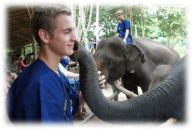
As a volunteer with The Thai Elephant Conservation Project, I had the opportunity to work with elephants on a daily basis at the Thai Elephant Conservation Center in Lampang, Thailand, and under the supervision of professional handlers. While there, I not only bonded with my elephant and mahout (elephant trainer), but I learned to feed, ride, and bathe the elephants as well.
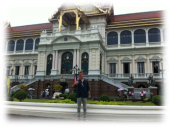 From the conservation project, I traveled to Bangkok to see the historical Grand Palace, the Wat Arun Temple, and floating markets. The hustle and bustle of the people, gold buildings, and high-paced urban environment was very different from Lampang. There is absolutely no shortage of temples and attractions in Bangkok!
From the conservation project, I traveled to Bangkok to see the historical Grand Palace, the Wat Arun Temple, and floating markets. The hustle and bustle of the people, gold buildings, and high-paced urban environment was very different from Lampang. There is absolutely no shortage of temples and attractions in Bangkok!
The final leg of my trip was by far the most inspiring. I spent two weeks immersing myself in the Karen culture of Northern Thailand, preparing lesson plans and teaching classroo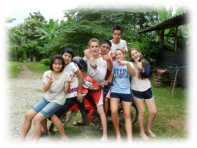 ms of Karen students. The Hill Tribe Support Project was created by Rustic Pathways to offer opportunities to Karen students of the Mae Sariang province—who would otherwise not be exposed to such experiences. By offering these students the opportunity to graduate high school, the likelihood of attending an institution of higher education is even greater. Not only did this experience expose me to the depth of Thai culture, but allowed me to learn a great deal about myself. I learned to make the most out of every opportunity I am given and to never take anything for granted.
ms of Karen students. The Hill Tribe Support Project was created by Rustic Pathways to offer opportunities to Karen students of the Mae Sariang province—who would otherwise not be exposed to such experiences. By offering these students the opportunity to graduate high school, the likelihood of attending an institution of higher education is even greater. Not only did this experience expose me to the depth of Thai culture, but allowed me to learn a great deal about myself. I learned to make the most out of every opportunity I am given and to never take anything for granted.
As I look back on my incredible journey through Thailand, I think of the people with whom I interacted and how wonderfully proud they were and the rich culture they possess. In a land dominated by majestic Buddhist temples and so many happy, peaceful people, it was hard for me to hear about recent political events that have caused the country to reach a new level of turmoil. On Thursday May 22, 2014 Thailand’s army seized power of the government. Journalists, scholars, and politicians have been ordered to surrender at army bases and General Prayuth Chan-ochoa, backed by the Royal King of Thailand, says there is no timeline on when a new democracy will be elected to run the country. As of now Thailand is under martial law, the military has deployed troops along key intersections throughout the city and has set a curfew of four hours (Midnight to 4 a.m.). Thailand’s economy has been negatively affected by political unrest resulting in a lack of business confidence in theregion along with an increase in inflation—which rose from 2.45 percent to 2.62 percent in a month’s time.
So what’s next? With no timeline for a new government to be set in place what can we expect in the preceding months? Certainly with each passing day the people of Thailand grow more impatient and mass gatherings, which are forbidden by the military, show there is immense pressure for a return to a democratic form of government.
With all that is taking place, it is important to remember how strong and welcoming of a country Thailand truly is—something I experienced during my own travels. I have faith that the people of Thailand will build a government that they can all be proud of, putting an end to the political turmoil.
Global Travelers and Culture Shock
Posted: May 30, 2014 Filed under: Global Travel Scholarship, Scholarship, Student, Travel Leave a comment2014 Global Travel Scholars
All of us here at the World Affairs Council of Pittsburgh are pleased to announce we will be sending five students abroad as part of our Global Travel Scholarship program. This scholarship program, managed in partnership with the Experiment in International Living, provides an opportunity for local high school juniors to travel to foreign countries. Focus is placed on those who would ordinarily never have this chance. Whether it is trekking to Machu Picchu in Peru or learning how to draw anime in Japan, for the past decade Global Travel Scholars have been leaving behind the comforts of home to experience firsthand the joys and challenges of living abroad.
This year’s selection process was especially rigorous, as each participating school was only able to nominate one candidate. Starting with 35 nominated students, five scholars were selected to participate in the program. Through the generous financial support of regional foundations, corporations, and individuals, the Global Travel Scholars will spend three to five weeks this summer living in Brazil, Spain, Botswana, Tanzania, or Japan.
Let’s meet the 2014 Global Travel Scholars:
Edgar Bahena, a junior at Pittsburgh Science and Technology Academy, has a strong interest in science and music which drew him to choose Brazil, whose culture is ripe with musical diversity and new scientific avenues. He is eager to discover what opportunities he will find that align with his growing interests.
James Burke, Jr, a junior at The Kiski School, will be traveling to Spain to immerse himself in Spanish culture while practicing the language in an intensive program. As Vice President of the Culture Pot, a school club that embraces cultural diversity, he is looking forward to having the opportunity to go abroad to experience a new culture firsthand. He sees this as an opportunity to grow as a leader in his community.
Tessa Houser, an already active volunteer in her community and a junior at Quaker Valley High School, is ready to embark on her next community service project in Tanzania. Tessa is delighted to have the chance to learn and experience new activities and perspectives to enhance her already active life. She sees this as a way to open doors for her future.
Matthew McDonald, a junior at Fort Cherry Senior High School, will be spending five weeks in the rural and urban areas of Botswana. A very active member of his community, he is overjoyed to be able to enhance his understanding of the world to become a stronger, more insightful leader in the future.
Raheem Perry, a junior at Imani Christian Academy, is an avid artist and cartoon creator who will be joining fellow enthusiasts this summer in Japan. He is very excited to improve his self-taught skills in the hope of achieving his dream of one day becoming an entrepreneur in publishing.
Please join us in congratulating these students on such a tremendous accomplishment!
*****
Adjusting to Culture Shock
Before leaving for their respective countries all of the scholars participate in various pre-departure workshops to prepare them for their time abroad. A theme discussed throughout these workshops is culture shock. These feelings of anxiety and being overwhelmed and frustrated in a new country are common among many of us who travel internationally. Whether you are traveling for an extended period of time like our Global Travel Scholars, or planning a brief two-week vacation with the family, chances are you’ll experience some form of culture shock.
Research shows that culture shock comes in four stages and can be experienced both when traveling abroad and upon your return home. These stages include:
- Honeymoon Stage: Everything is new and exciting during the first few days or weeks.
- Frustration Stage: People experience difficulty sleeping, sadness, homesickness, overeating, unexplained crying, exhaustion, or a desire to withdraw.
- Adjustment Stage: Travelers become familiar and comfortable with their surroundings, culture, people, food, and host language. They will be better able to handle situations they once found frustrating.
- Acceptance Stage: Travelers will be able to compare the good and bad of the host country to the good and bad of their own country. They will begin to feel less like foreigners and their host country will begin to feel more like a second home.
How you manage culture shock can greatly influence your entire travel experience. If you find yourself in a situation where the culture shock is difficult to manage, think of different ways to connect with the area and the people around you. Here are some tips:
- Take some time to explore the area, try new foods, or take part in a cultural activity. This is also a great time to make new friends.
- Reach out to your fellow travel mates, discuss any frustrations, or spend a few moments by yourself to write down what you are experiencing. Ask questions to clarify any cultural confusion that may be frustrating you.
- Take time to make friends with the locals. Start to go outside of your comfort zone or explore and learn new cultural traditions and languages.
- Take the time to strengthen bonds with the people you have become close with, take part in as many new experiences as possible, and remember to engage and have fun!
Parents can help too. For those who have children traveling abroad this summer, see this resource on helping your child adjust to culture shock.
These are easy tips that can make all the difference in your international experiences.
Congratulations again to our Global Travel Scholars, and best of luck to everyone traveling abroad this summer!
The first steps in teaching English abroad
Posted: April 11, 2014 Filed under: Education, France, Japan, languages, Russia, Teachers, Travel Leave a comment
Here at the World Affairs Council of Pittsburgh, we frequently receive inquiries about the different opportunities that exist to teach English as a second language (ESL) abroad. Teaching ESL to students around the world is a rewarding experience that exposes one to a new culture while also gaining quality skills needed to succeed in a global 21st century workforce.
If you are interested in participating in this unique work opportunity, here are a few things to keep in mind.
- The more teaching experience you can get before going abroad, the better – particular in teaching ESL. This experience makes you that much more competitive during the interview and hiring process.
- To teach for any reputable organization abroad you should have some kind of Teaching English as a Second Language (TESL) Certificate (one example is the CELTA). There are centers across the United States that host classes and certificate programs in this field. The length of program varies, as well as the intensity of the course. You should do your own research, but if you’re looking for examples check out Bridge-TEFL.
- The amount of support an organization will provide while you are abroad varies on the company. Generally, a school should find accommodations for you, and offer trainings and workshops to help you transition into the classroom. Be sure to do significant research about any organization before you interview or sign a contract!
In some countries, the easiest way to teach is to be hired by a private language school. However, there are a number of respectable teaching programs you can go through around the world. We’ve provided a short list below. It’s always important to do your own research as these are not the only opportunities that may exist. Typically, the best way to apply is by sending your resume to the email address given on the respective websites.
A few well-known programs for teaching English abroad include:
- English First – opportunities in Russia, China, and Indonesia.
- Japan Exchange and Teaching Program (JET) – opportunities in Japan
- Teaching Assistant Program in France (TAPIF)
In addition, the following sites provide listings on general teaching opportunities, as well as resources for aspiring (and current) ESL teachers:
Have a good resource from your own personal experience teaching English abroad? Let us know!
Internship Opportunities and Global Learning for the Summer of 2014 and Beyond
Posted: March 21, 2014 Filed under: Career, Cross-Cultural Dialogue, Cybersecurity, Education, EU, Europe, Human Rights, international development, languages, National Security, Resources, School Programs, Travel Leave a commentThere is a lot to be learned outside of the classroom! Whether you are thinking about college applications or possible career plans, a summer internship, study, or travel opportunity is worth considering, and with summer just around the corner many high school, undergraduate, and graduate students are doing just that.
To help start the search process for opportunities available this summer and throughout the school year, we’ve compiled a list of some great internships, study abroad, and travel experiences in international affairs across a wide range of organizations. Use the information below as a beginning guide on your search, but be sure to do some research on your own as well! To help you out, we have listed some additional resources for more information.
Attention teachers: we’ve included a section on summer opportunities for educators below. Scroll towards the end of this post for information on two exciting opportunities.
Internship Opportunities
Amnesty International – Internship Opportunities: Amnesty International is a human rights organization that provides unpaid summer, fall, and spring internships to rising college juniors (and above) in New York, Washington D.C., Atlanta, San Francisco, and Boston.
Arms Control Association Internships: The Arms Control Association and Arms Control Today offer research and journalism internships in Washington, D.C. This internship program, offered in the spring, summer, and fall, is best suited for undergraduate students.
Asia-Pacific Economic Cooperation (APEC) Internships: APEC is an international affairs and economic organization that provides unpaid internships to graduate-level students who are nationals or permanent residents of APEC member economies. In some cases a financial stipend may be available. The Secretariat seeks candidates from a variety of academic disciplines, specifically those who have a strong interest in the work of international organizations and, in particular, international affairs and international economics.
The Carter Center Internship Program: Semester-long internships are open to undergraduate and graduate students and recent graduates in areas such as health, peace, and operations. These internships are unpaid and may take place in cities across the nation and abroad. Internship opportunities are offered year round.
Center for Strategic and International Studies – Internships: CSIS offers full and part-time internships in the fall, spring, and summer for undergraduates, advanced students, and recent graduates who are interested in gaining practical experience in public policy.
Central Intelligence Agency – Student Opportunities: The CIA has competitive internship opportunities available to undergraduate and graduate students in a range of fields, including analytical; business, IT, and security; clandestine service; language; and science, engineering and technology. The student opportunities page also includes information on scholarship and co-op programs, as well as ongoing opportunities for students of all ages. Due to the extensive application and background check required, interested applicants should apply 12 months prior to their desired start date. Applications for the Summer 2015 internship program are due March 31, 2014.
Council on Foreign Relations Internships: CFR offers volunteer internship opportunities for college students, graduate students, and recent graduates focusing on international relations and who are pursuing a career in foreign policy or a related field. Interns are recruited year-round on a semester basis to volunteer in both the New York and Washington, DC offices, and all internships are filled on a rolling basis.
Doctors Without Borders – Paid Internship Program: A very competitive program, Doctors Without Borders offers internships in many departments, including HIV/AIDs, Human Resources, Marketing, Medical Editing, Planned Giving, Public Events, Press, and Web. Internships take place in New York City. The deadline to apply for a summer internship is April 11, 2014.
European Union – Washington Delegation Internships: Open to college/university students and recent graduates, internships with the Washington Delegation are unpaid and preference is given to applicants who are available full-time. Internships are offered during the fall semester, spring semester, and summer.
Human Rights Watch Internships: Internships are available to undergraduate and graduate-level students, both within the U.S. and abroad.
International Monetary Fund Internships: The IMF offers approximately 50 paid summer (June – October) internships each year to highly qualified PhD students.
Korea Economic Institute Internships: Applicants to KEI should be graduate students (or exceptional undergraduate students) with a background in political science and/or economics as well as an interest in Asia-Pacific issues, especially Korea. Internships are offered for the fall, spring, and summer.
NATO Internships: The application window for a NATO internship is from March-April for the following year. Internships last 6 months, beginning in either September or March, and are based in Brussels, Belgium. Application requirements include an online application form, CV, and letter of motivation.
United Nations Internships: The UN Programme on Youth provides a list of internships available with the United Nations. Please visit each link for specific details and applicant criteria.
United States Commercial Service Internships: The U.S. Commercial service offers student volunteer internships at U.S. Field Offices, Headquarters, and International Field Offices. This page provides more information about applying to the different locations.
United States Department of State – Student Programs: This page offers information for high school, college, and graduate/post-graduate opportunities within the State Department. Please visit each opportunity for details and applicant criteria.
United States Office of Personnel Management – Student Jobs (USAJobs.gov): This website is the portal to all job and internship applications for the federal government for students and recent graduates. Internships can be found by searching the site for “internship.” This page also offers information on the Pathways Program, the Presidential Management Fellows Program, summer jobs, and volunteer experiences.
United States Senate or House of Representatives Internships: Many offices of government officials in the House of Representatives and United States Senate offer internships for high school students, undergraduates, and graduate students. A variety of opportunities can be found at the link provided. You are also encouraged to visit the professional website of a representative, senator, or committee for more detailed information.
USAID Internships: The U.S. Agency for International Development (USAID) offers paid and volunteer-based internships, both domestically and abroad, for college and graduate students.
White House Internships: Applicants for a White House internship must be U.S. citizens who will be at least 18 years old on the first day of the internship, and must be enrolled in an academic program. A completed application for this competitive program includes two essay questions, two letters of recommendation, and a resume.
World Affairs Councils: Like the World Affairs Council of Pittsburgh, many World Affairs Councils across the country offer internships at their organization. This link goes to the World Affairs Councils of America list of member Councils.
World Bank Internships: The World Bank offers paid internships in the summer (June-September) and winter (December-March), primarily in Washington, D.C. Applicants are required to be graduate or PhD students who have ideally completed one or more years of graduate-level education at the time of the internship.
Summer Travel and International Learning Opportunities
Amizade Global Service-Learning: This Pittsburgh-based nonprofit organization offers experiences for individuals and groups to travel abroad to participate in service-learning opportunities. There are also accredited study-abroad opportunities, offered in partnership with West Virginia University.
Global Citizen Year: During this year-long total immersion program, offered to recent high school graduates, students will develop critical skills, master new tools, and learn from recognized experts all while living abroad and being fully immersed in a new culture. Programs are offered in Brazil, Ecuador, and Senegal, and last from the summer following high school graduation to the following April.
Global Scholar: An intensive two-week academic enrichment program that offers rising high school juniors and seniors the chance to sharpen their understanding of international affairs in a university setting. Global Scholar Prep is held at American University in Washington, D.C.
Kosciuszko Foundation Summer Study Abroad Programs: A variety of study abroad programs are offered by the Kosciuszko Foundation for study at the Catholic University of Lublin and Jagiellonian University of Cracow in Poland. Programs range in length and include courses in the Polish language, history, and culture with sightseeing trips on weekends. The deadline to apply is May 15, 2014.
National Geographic – Student Expeditions: Students completing 9th through 12th grades are eligible to participate in National Geographic Student Expeditions. There are four types of trips offered: expeditions, field workshops, photo workshops, and community service programs.
Summer at Georgetown: Georgetown University’s Summer Programs for High School Students include a range of activities, such as Institutes on International Relations and National Security/Counter-Intelligence; Fundamentals of Business: Leadership in a Global Economy; and summer courses on a range of international topics. The deadline to apply is April 15, 2014.
Summer Seminar on Global Issues: New in 2014, the Summer Seminar on Global Issues is a two-week, non-residential program offered by the World Affairs Council of Pittsburgh in partnership with the Global Studies Center and the University Center for International Studies at the University of Pittsburgh. Open to rising high school juniors and seniors, the Summer Seminar will expose students to a range of interdisciplinary global issues, and will include language study, presentations from regional experts, simulation and scenario activities, among others. The deadline to apply is April 30, 2014.
World Learning: A partner of the World Affairs Council of Pittsburgh’s Global Travel Scholarship Program, World Learning offers travel learning opportunities for high school and undergraduate students. The Experiment in International Living offers 3-5 week programs for high school students in 30 different countries, while SIT Study Abroad offers college students more than 70 semester, academic year, and summer programs around the world.
Additional Resources
American Foreign Service Association – Student Resources: The AFSA provides students with information on careers in Foreign Service, internship opportunities in foreign affairs, and other ways to become involved with international relations.
EuroBrussels – Internship Level Jobs: This site lists European Affairs internships/traineeships that are not affiliated with the EU Institutions. Interested applicants will need to contact the organizations or read the requirements to verify whether U.S. citizens are eligible to apply.
European Union Institutions – Traineeships for Students: A listing of internships at the Institutions of the EU in Brussels. There may be a limited number of internship positions available for non-EU students.
Global Job Board: An extensive up-to-date listing of job and internship opportunities, searchable by level, location, and sector. A great resource for internship- and job-seekers alike.
Global Career Blog (Passport Career): Although the main Passport Career site requires registration (and payment) the blog is available to everyone, and is full of advice for job-searching and working abroad.
Summer Opportunities for Educators
10th Annual Great Decisions Teacher Training Institute: Organized by the Foreign Policy Association’s Great Decisions program, the Teacher Training Institute (June 30-July 2) provides educators a unique opportunity to build skills in teaching global affairs, develop international studies curricula, learn about related teaching resources, and interact with other committed international affairs educators. Topics range from defense technology to the Islamic awakening. The Institute is held in New York City. Applications are due by Friday, April 25, 2014.
Summer Institute for Teachers: A three-day (June 24-26, 2014) summer workshop for educators hosted by the World Affairs Council of Pittsburgh, which consists of briefings from experts on contemporary world affairs, small group problem solving exercises, and lesson-planning sessions. This year’s topics will focus on a range of issues including transnational threats, genocide, as well as regional studies covering South America.
Promoting International Education across the Country
Posted: November 15, 2013 Filed under: Education, languages, Travel Leave a comment Today marks the final day of the 14th annual International Education Week (IEW), an initiative that is now celebrated in over 100 countries worldwide. Supported by both the U.S. Department of State and the U.S. Department of Education, International Education Week is designed to celebrate and advance global educational exchange opportunities. To encourage participation, the U.S. Bureau of Educational and Cultural Affairs has made available promotional materials for schools, embassies, businesses, and community organizations to engage in their own inventive format for promoting international education. You can access these resources on their website, here. The site also highlights many of the creative events hosted by educational institutions across the country. For instance, just yesterday Fox Chapel Area High School hosted “Lunch and Language Roundtables,” inviting students to practice their language skills with native German, Spanish, Italian, and French students.
Today marks the final day of the 14th annual International Education Week (IEW), an initiative that is now celebrated in over 100 countries worldwide. Supported by both the U.S. Department of State and the U.S. Department of Education, International Education Week is designed to celebrate and advance global educational exchange opportunities. To encourage participation, the U.S. Bureau of Educational and Cultural Affairs has made available promotional materials for schools, embassies, businesses, and community organizations to engage in their own inventive format for promoting international education. You can access these resources on their website, here. The site also highlights many of the creative events hosted by educational institutions across the country. For instance, just yesterday Fox Chapel Area High School hosted “Lunch and Language Roundtables,” inviting students to practice their language skills with native German, Spanish, Italian, and French students.
If you are interested in hosting your own global education event, you aren’t too late! Similar programs continue to take place in the coming weeks. For example:
- On November 19, 2013, Liberty University, located in Lynchburg, Virginia, is holding a sampling of coffees and teas from around the world throughout the entire day.
- On Wednesday, November 20, North Carolina State University is holding a “Passport Fair,” and will host a representative from the State Department to process student passports in one simple step.
- On November 18, 2013, Moraine Park Technical College will announce the winner to their Best Travel Photograph competition. For roughly six weeks anyone could submit photos from abroad to the International Education Facebook page and viewers voted on their favorite.
The theme of this year’s International Education Week is International and Education: Learning Matters Around the World. As the many exciting events already planned indicate, many of us are passionate about the value of international education and studying abroad, and participation in these types of programs is on the rise. The most recent Open Doors report from the International Institute of Education revealed 819,644 international students studied in the United States during the 2012-2013 school year, and 283,332 American students studied abroad during the 2011-2012 school year (this data for the 2012-2013 academic year is not yet released). These statistics are impressive, showing that more students than ever are engaging in experiences abroad. Even more exciting is the fact that students aren’t the only ones immersing themselves in another country. The U.S. Bureau of Educational and Cultural Affairs oversees programs in 160 countries, providing opportunities to youth, students, educators, artists, athletes, and rising leaders.
These global exchange programs not only provide a gateway for exploration of a different culture, but they also foster some of the most highly educated and most deeply influential people of our time. Looking back to those who have participated in the U.S. Bureau of Educational and Cultural Affairs exchange programs, 55 are Nobel Prize winners, eight are current or former ambassadors to the United Nations, and three are current heads of international organizations. In the modern era of professional opportunities that transcend borders, the desire to promote global competency through international education programs continues to grow!
By: Samantha Harper, World Affairs Council of Pittsburgh Intern
Travel Tales from a WAC Intern
Posted: August 15, 2013 Filed under: Czech Republic, Europe, Travel | Tags: Travel Leave a commentEarlier this summer, I was awarded the opportunity to attend a conference in Prague as one of five delegates on behalf of the University of Pittsburgh. Organized by CivicConcepts International, the International Youth Leadership Conference in Prague (IYLC) was truly a cross-cultural experience, as it provided a forum for 50 students from six continents to discuss international topics and leadership issues.
I was personally excited to attend the IYLC because during the course of the conference, we would be participating in three experiential learning simulations: a United Nations (UN) Security Council struggling with the Syrian situation, an International Criminal Court pre-trial chamber hearing on the case of Omar al-Bashir, and a two-day European Parliament session complete with lobbying and amendment writing. I’ve been competing in Model UN conferences for a long time, and I couldn’t wait to test my skills on an international stage.
Overall, this experience reminded me of experiential learning’s importance in education. When you have to argue for and defend a position, especially if that position doesn’t align with your personal beliefs, memorizing facts isn’t enough. You need to know background on the issue, how your position (and everyone else’s) developed over time, and why those who support your position think that way. This preparation takes time: to research, to read, to synthesize enough that you can make your arguments without notes. Leading up to the conference, I cultivated a binder full of articles and dulled a few pencils preparing to the best of my ability.
When I arrived in Prague, I was excited to spend the three days before the start of the conference sightseeing, exploring the city, and taking a break from my IYLC preparations. However, I quickly realized that my companions and I had spent all our time researching the simulations and had neglected preparing for the city. While exploring our surroundings, we saw many architecturally interesting buildings and spectacular views. Unfortunately, we weren’t sure about the significance of anything past its name printed on the map our hostel had provided. The most common dialogue within our group became “That’s pretty, what is it?” “I dunno, just take a picture.”
Once the conference started, I was so thankful that our schedule included guided excursions into the city. We toured embassies and the Czech Senate, and some of our simulations took place in the city. In each of these places, a guide led us on a tour of the facility and provided a historical overview of the building and its significance to the city. On the third day of the conference, we had a reception at the “Dancing House.” When we arrived, I realized it was a building that had stood out to us earlier in the trip – one we had visited without knowing any background. I finally learned the story behind it, and it’s one I’ll never forget.
So even if you don’t have a conference full of people to help you simulate a UN Security Council, you can use principles of experiential learning in other arenas. When traveling, as I have learned, it could be the difference between a photo album full of “cool buildings” and one full of landmarks that remind you of a trip that fostered a deeper cultural and historical understanding of a foreign city.
By Nina Wroniak, World Affairs Council of Pittsburgh Intern
Reflections from a Global Travel Scholar
Posted: July 15, 2013 Filed under: Global Travel Scholarship, Student, Travel | Tags: Costa Rica Leave a commentIt is hard to believe that it was one year ago that I was preparing for my trip to Costa Rica. I can remember the excitement and anticipation that I had as the day of departure got closer and closer. I was going shopping for items I thought I may need and spending time with family and friends that I wouldn’t be able to see for a month. All of the preparations were exciting and it was fun to spend time with my mom as she helped me pack. I remember sitting in my room the night before I left with my younger sister, Heather. As excited as I was to go, it was going to be really hard to leave my family, especially my sister, because I was going to miss them so much. We stayed up all night just talking and crying a little but we knew that it would be a good experience for both of us. As I got on the plane from Pittsburgh and began the first part of my journey, it finally hit me that I was going to be spending an entire month in Costa Rica with people I had never met before – not to mention all of the new adventures that lie ahead of me. It was terrifying, but in a good way. I was scared, but my excitement held me together and allowed me to step onto the plane.
I am so glad that I was given the opportunity from the World Affairs Council of Pittsburgh to travel to Costa Rica because it was honestly one of the most rewarding experiences of my life and it has had such an important impact on my life. I would not trade it for anything. I met some of the most amazing people during my trip and made so many great friends. There is no way for me to sum up my trip in a few words because so much happened and I did not recognize the changes and effects it had on me until I got off the plane in Pittsburgh and adjusted to life in the United States once again. I was told many times that I would come home a different person and that I would see the world in a new way when I returned, but I did not believe it. I knew what I wanted to be in the future. I knew who I was and I did not think the experience would have that large of an impact on me. My mentor told me that the transition back to the United States would be as difficult as the transition into Costa Rica. I didn’t believe this either. I thought how could I have difficulty adjusting to life back at home? But everything that people told me before I left held true.
The people that I met in Costa Rica, my group leader, Max, my group members, and the Costa Ricans all left lasting impressions on my life. My group of ten from all over the United States and one member from Chile al became such close friends. It was as if we had known each other for years. I still talk to most of them via Facebook and texting. In the one month that we were together we all formed a really close bond that will remain for a long time even though we are all so far apart. My group leader Max was amazing. He was so knowledgeable about his country and was a great tour guide. But this was his job. The part that set him apart from any tour guide was the fact that he connected with each of us on a personal level. He knew that we missed home at times and knew how each of us needed help. He was easy to talk to and really knew how to talk to us. Max was definitely one of the reasons I enjoyed my trip as much as I did and I still communicate with him on occasions.
When I got home, like my mentor said, I had a difficult time adjusting. I missed the friends that I had become so close with and the country that I had lived in and become a part of for the past month. Don’t get me wrong, I was glad to get home and see my family and friends that I had missed so much but I wanted to take them with me back to Costa Rica and all of my new friends. It was strange not waking up in Costa Rica to the sounds of the rain forest or the ocean. It was weird being home and back in the chaos and busy schedules in the United States. Eventually I adjusted back to my normal schedule of soccer and summer assignments and that is when I really noticed that changes that had occurred within me. I was not a completely new person. I still wanted to study biomedical engineering in college and become a medical researcher. I still liked to play soccer and spend time with my friends and family. It appeared like the trip hadn’t changed me too much.
But once the shock of being home wore off I recognized subtle changes in myself. I was more confident in myself. I was not afraid to be who I was. I was not as worried about what others thought of me. I wasn’t afraid to talk to people and try new things. I was more adventurous and outgoing. These were all skills that I learned in Costa Rica. I faced my fears in Costa Rica. I did things I never imagined I would do and it made me grow as a person. I noticed other subtle changes, like the attention I paid to how my actions affected the environment and how I thought of things on a more global level instead of just my community or area. Almost one year later, I still think of my experiences in Costa Rica, the friends I made, and the lessons I learned. It is something that I will never forget because it truly is an experience that has forever changed my life. I am so grateful for the chance the World Affairs Council of Pittsburgh has given me because of the impact it really has made on my life even one year later.
By Heidi Schmidt, 2012 Global Travel Scholar
A Return to Berlin (Part 4)
Posted: May 20, 2013 Filed under: Europe, Germany, Pittsburgh, Travel Leave a commentSaturday, May 18, 2013
It is amazing how quickly this week has passed! It has been an incredible combination of sight-seeing and high-level briefings. We’ve all learned a great deal – and have heard some different perspectives on some of the challenges Germany and Europe face.
The pace of the first part of the week continued. On Thursday, we spent the day in Potsdam visiting historic Cecilienhof, Sansouci (the site of the Potsdam Conference negotiations after World War II), and the Haus am Wannsee (where mid-level Nazi leaders plotted the “Final Solution”).
On Friday morning, the group enjoyed briefings with foreign service officers from the Economic and Political Sections at the U.S. Embassy. And in the evening, we had a closing dinner with former U.S. Ambassador to Germany, John Kornblum.
The take-away:
What’s the take-away after a week in Berlin measuring the pulse of contemporary Germany? Here are three brief observations:
- Berlin is looking forward to hosting President Barack Obama in mid-June – just a week before the 50th anniversary of President John F. Kennedy’s 1963 visit to Berlin and his famous “Ich bin ein Berliner” speech. This will be Obama’s first official trip to Berlin since he took office in 2009. He has been to Germany twice during his first year as president and was in Berlin as a presidential candidate in 2008.
- In the run up to the September 22 German parliamentary election, German politics are worth watching. The German Chancellor Angela Merkel is seeking reelection and a third four-year term. There seems to be little doubt that she will continue in her role as Chancellor. However, questions abound concerning the make-up of the governing coalition.Merkel’s conservative Christian Democratic Party will need a coalition partner to govern. Their current coalition partner – the Free Democrats – have fallen from nearly 15 percent in the last election to roughly five percent in opinion polls. Smaller parties such as the Pirate Party (which espouses greater internet freedom) and the new euro-sceptic Alternative for Berlin (which advocates a return to the Deutsch Mark) may siphon off some votes from the current coalition government. Taken together, the contraction of the Free Democrats and the rise of new parties may make it difficult for the current government to remain in office.
A return to a Grand Coalition – of the Christian Democrats and the Social Democrats – seems most likely. Some analysts and observers believe this is not ideal because Germany will stagnate. Others feel that this is the best-case scenario for Germany at this time.
One additional factor is how the Green Party will fare. They have been rising in the polls – and could serve as “king maker” to the conservative Christian Democrats or the more liberal Social Democrats.
- My sense is that the group left Germany with more questions about the future of Europe than they had when they arrived. One speaker talked about the challenge of “managing the relative decline of Europe” vis-à-vis rising powers, but almost all of the speakers talked about the strong role Germany plays within Europe and on the world stage. There are many questions about the future of Europe – and specifically the role France will play. Many of the speakers talked about a “sputtering” Franco-German engine although these two countries have been at the core of Europe’s postwar development.
All in all, lots of food for thought as we digest a week of new experiences and opinions…
by Dr. Steven E. Sokol, President and CEO, World Affairs Council of Pittsburgh
A Return to Berlin (Part 3)
Posted: May 20, 2013 Filed under: Germany, Pittsburgh, Travel Leave a comment
Wednesday, May 15, 2013
It has been a great week so far! On Sunday, we began the trip with a walking tour of the area immediately surrounding the hotel in historic East Berlin. We ventured over toward the west to the Brandenburg Gate by walking down the impressive boulevard Unter den Linden.
On Monday, the walking continued. We passed through a square with my favorite “monument” on our way to the German Historical Museum for a quick survey of 2000 years of German history. The square is Bebelplatz and this is where on May 10, 1933, a massive book burning by National Socialist students took place. Works from great authors such as Thomas Mann, Erich Maria Remarque, Heinrich Heine, and Karl Marx were taken from the library of the Humboldt University and burned. Altogether some 20,000 books were burned. The memorial is an underground library with empty shelves which one can view from above through a thick plate of glass.
Over lunch, we met with the head of the German Council on Foreign Relations, Dr. Eberhard Sandschneider, for a discussion of Germany’s place in the world. After lunch we headed to the German Foreign Office for briefings with the Coordinator for German-American Affairs and the Coordinator for Dialogue among Civilizations. In the first session in the Foreign Office, participants learned about the strong ties between Germany and the United States – and specifically the new U.S.-EU free trade agreement, the Transatlantic Trade and Investment Partnership (TTIP). In the second meeting, we discussed Germany’s relations with the Muslim world as well as immigration and integration in Germany.
On Tuesday, we started the day with a briefing at the Atlantik-Brücke – a non-profit founded in the 1950s to promote deeper ties between Germany and the United States. We met with two young “transatlanticists” who personify the next generation of young leaders. We ended the day with a special briefing about German energy policy with the head of ecologic.
The group spent most of the day on the famous Museum Island looking at artifacts from around the world – including the Pergamon Alter and the Gates of Babylon.
On Wednesday, the group learned about the Third Reich and the Cold War. We had the opportunity to explore Checkpoint Charlie and the Topography of Terror. In addition, we saw Daniel Libeskind’s Jewish Museum – which traces the history of Jews in Germany and Europe – as well as Peter Eisenman’s Holocaust Memorial.
Over lunch, the group met with Europe-expert Ulrike Guerot for a discussion of German and European politics, the euro crisis, and Franco-German relations. In the afternoon, we met with foreign policy expert and politician Hans-Ulrich Klose who also gave us a tour of the Reichstag building.
by Dr. Steven E. Sokol, President and CEO, World Affairs Council of Pittsburgh
A Return to Berlin (Part 2)
Posted: May 13, 2013 Filed under: Germany, Pittsburgh, Travel Leave a commentMay 11, 2013
The biggest surprise on arrival is the amount of construction in the heart of East Berlin and the heart of West Berlin.
After German reunification, Berlin was often referred to as a “city of cranes” because of all the construction taking place. Over 20 years later, cranes are still a fixture on the skyline.
by Dr. Steven E. Sokol, President and CEO, World Affairs Council of Pittsburgh


